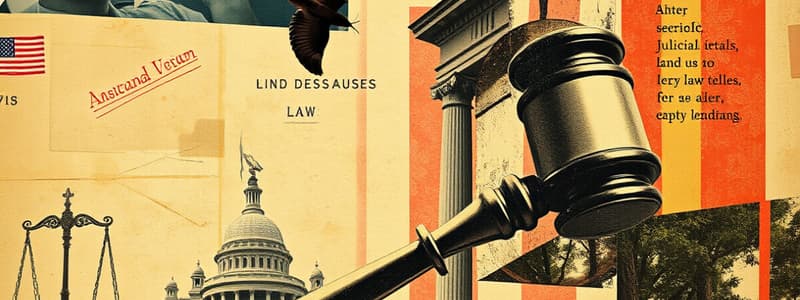Podcast
Questions and Answers
Match the following legal concepts with their explanations:
Match the following legal concepts with their explanations:
Criminal Code = The portion dealing with criminal law. Dual Court System = Describes the structure of state and federal courts in the U.S. Judicial Review = The power to determine the constitutionality of legislative enactments. Effectiveness = Carrying out justice activities with regard for equity and public safety.
Match the following outcomes with their definitions:
Match the following outcomes with their definitions:
Decisions (courts) = Written opinions of appellate courts with the force of law. Code = A comprehensive set of laws arranged by subject. Dual Federalism = A system where both national and state governments operate. Effectiveness = Proper regard for equity in justice system activities.
Match the following legal entities to their descriptions:
Match the following legal entities to their descriptions:
Bureau of Justice Statistics = Agency focused on crime data and analysis. Common Law = Legal system based on judicial decisions. Appellate Court = Court that reviews cases from trial courts. Constitution = Fundamental legal framework of a government.
Match the following legal principles with their impacts:
Match the following legal principles with their impacts:
Match the following branches of law with their functions:
Match the following branches of law with their functions:
Match the following entities to their functions:
Match the following entities to their functions:
Match the terms related to the criminal justice system with their definitions:
Match the terms related to the criminal justice system with their definitions:
Match the concepts of criminal justice with their descriptions:
Match the concepts of criminal justice with their descriptions:
Match the legal terms with their meanings:
Match the legal terms with their meanings:
Match the following court-related concepts with their implications:
Match the following court-related concepts with their implications:
Match the court terms with their functions:
Match the court terms with their functions:
Match the justice concepts with their characteristics:
Match the justice concepts with their characteristics:
Match these legal concepts with their potential outcomes:
Match these legal concepts with their potential outcomes:
Match the definitions with the appropriate terms:
Match the definitions with the appropriate terms:
Match the terminology with their contexts in law:
Match the terminology with their contexts in law:
Flashcards are hidden until you start studying
Study Notes
Legal System and Structure
- Appellate Court: Rehears cases from trial courts, reviewing previous judicial decisions.
- Dual Court System: Features both state and federal courts, reflecting the American governmental framework.
- Congress of the United States: Comprises the U.S. House of Representatives and Senate; responsible for legislative authority.
- Three Branches of Government: Consist of executive, legislative, and judicial branches as defined by the Constitution.
Legal Framework and Principles
- Bureau of Justice Statistics (BJS): Collects and disseminates information on crime, offenders, victims, and justice systems.
- Code: Comprehensive law collections organized by subject.
- Common Law: Originating in England, focuses on judicial decisions and precedents, used in the U.S.
- Constitution: Fundamental principles governing a nation or state, establishing legal frameworks.
- Criminal Code: Governs criminal law within the United States Code or state codes.
- Penal Code: A set of laws defining crimes and punishments, representing substantive criminal law.
Judicial Processes
- Decisions (courts): Written opinions from appellate courts, binding in common law jurisdictions.
- Judicial Review: Enables the Supreme Court to assess the constitutionality of legislative actions.
- Federal Rules of Criminal Procedure: Regulatory framework overseeing federal criminal prosecutions.
Individual Rights and Legal Protections
- Due Process: Guarantees fair treatment in the criminal justice system for defendants.
- Procedural Due Process: Ensures fundamental fairness in legal proceedings for individuals.
- Infancy Defense: Doctrine that children are incapable of wrongdoing, exempting them from prosecution.
Government and Justice Efficiency
- Executive Branch: Manages public affairs and enforces laws and policies.
- Effectiveness: Involves equitable justice and adherence to constitutional rights for offenders.
- Efficiency: Utilizes resources economically to meet legal goals and enhance public safety.
Justice System Dynamics
- Fairness: Advocates for equal treatment of offenders and equitable consideration in sentencing.
- Nonsystem Argument: Suggests conflict and disorganization within the criminal justice system, indicating a lack of cohesion.
- Juvenile Justice: Specialized components within the justice system addressing offenses by minors.
Legal Negotiations and Agreements
- Plea Bargain: A deal where the defendant admits guilt to a lesser charge or sentence than potentially pursued at trial.
- Hierarchical Structure: Organizational model in which elements are ranked based on authority or importance.
Supreme Court Overview
- SCOTUS (Supreme Court of the United States): The highest judicial authority, consisting of eight Justices and one Chief Justice.
- Unconstitutional: Identifies laws or actions that violate constitutional provisions.
Studying That Suits You
Use AI to generate personalized quizzes and flashcards to suit your learning preferences.


